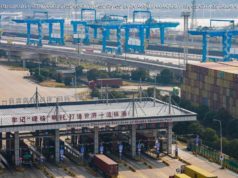The disappearance of a bishop is an object lesson in interacting with Beijing.
As China’s economic and military power has expanded over the past decade, Beijing has shown a proclivity to renege on agreements and to make access to its markets conditional on acceding to its shifting demands. Countries, companies, and international organizations have found it difficult to push back.
The Vatican, as both a state and the spiritual head of a major international institution, is now grappling with this challenge. In September, the Holy See inked a provisional agreement with Beijing in an attempt to mend an almost 70-year-old schism. Vatican leaders argued that the deal would promote unity. They insisted it would enable them to better minister to their Catholic flock in China. They dismissed concerns that it constituted “selling out” to a repressive government.
Then a Chinese bishop disappeared. The suspected arbitrary detention of a Vatican-appointed priest last month has reinforced worries that Beijing won’t ease its pressure on the Church but will instead use the deal to push for even more control.
The implications stretch well beyond the religious sphere—in fact, the Vatican deal is a broader object lesson in the costs of doing business with Beijing. If China is willing to backtrack on its agreement with the Vatican, that bodes poorly for foreign governments, international companies, and other organizations involved in dealmaking with the country.
Since the Vatican and Beijing broke diplomatic ties in 1951, the Church in China has been divided into official state-sanctioned Catholic places of worship with bishops appointed by Beijing, and underground churches whose leaders are secretly appointed by the Vatican but not officially recognized by the Chinese Communist Party. CCP authorities have harassed and detained underground clergy, and the dueling bishoprics have caused confusion and division among the laity. The pope has not been allowed to visit China or even, until recently, to enter its airspace.
Vatican leadership suspects that the schism is one reason for Catholicism’s stagnant growth in China. There are about 10 million Chinese Catholics (though estimates vary), a number that has remained relatively steady in recent decades while the number of Protestant Christians has risen dramatically, reaching up to 100 million by some counts. That was a major motivation for the deal, which has been under discussion since 2014.
Under the terms of the agreement, which has not yet been fully made public, Pope Francis has recognized seven party-appointed bishops, while Beijing has in turn recognized a portion of the formerly underground Vatican-appointed ones. In the future, the Holy See is expected to reach a compromise with Beijing over new appointments, in an arrangement that gives the CCP some amount of control over who is selected.
But then last month, Shao Zhumin, a Vatican-appointed bishop of the eastern city of Wenzhou who remains unrecognized by Beijing, disappeared.






